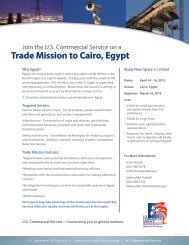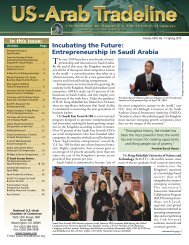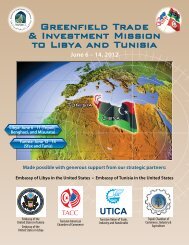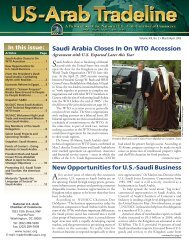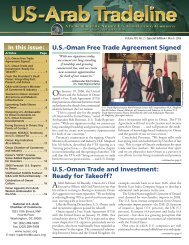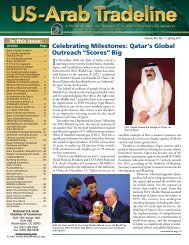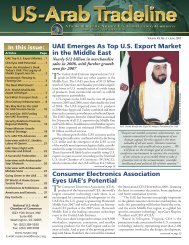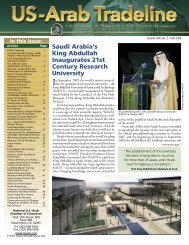Jordan - National US-Arab Chamber of Commerce
Jordan - National US-Arab Chamber of Commerce
Jordan - National US-Arab Chamber of Commerce
Create successful ePaper yourself
Turn your PDF publications into a flip-book with our unique Google optimized e-Paper software.
Roundtable at N<strong>US</strong>ACC Explores Reform andTerrorism in Saudi <strong>Arab</strong>ia“Envision yourselves in a museum in front <strong>of</strong> anancient tapestry that depicts a famous and mythicaltale <strong>of</strong> love and pain. Being old, it has one smallsquare inch at the bottom right-hand corner withfrayed threads. Imagine that a camera zooms ontothis square inch and projects it onto a screen the size<strong>of</strong> the original tapestry. And so, through the power<strong>of</strong> this medium, you have lost sight <strong>of</strong> the beautifulstory <strong>of</strong> the tapestry and you see only the negativeimage <strong>of</strong> the minute, frayed fault.”On October 7, N<strong>US</strong>ACC and the Center for InternationalPrivate Enterprise (CIPE) hosted aroundtable discussion on Reform and Terrorism in Saudi<strong>Arab</strong>ia. Mr. Amr Khashoggi was the featured speakerfor the event, which was held at N<strong>US</strong>ACC and attendedby upwards <strong>of</strong> 50 public and private sector representatives.Khashoggi is CEO <strong>of</strong> the Amkest Group in Saudi<strong>Arab</strong>ia and is a regular visitor to the United States.Khashoggi talked about internal pressures for reform,with more than 60 percent <strong>of</strong> the population under theage <strong>of</strong> 20, and external pressures, including those fromthe United States and Europe. Khashoggi noted thatAmr Khashoggi, CEO <strong>of</strong> Amkest Group, addressed a full house atN<strong>US</strong>ACC.many in the West seek to transform Saudi <strong>Arab</strong>ia intothe image <strong>of</strong> America and Europe. “I believe this iscounter-productive,” Khashoggi stated, “and it underminesthe efforts <strong>of</strong> Saudis who want to move the countryforward, yet not lose sight <strong>of</strong> the important role Islamand our historical traditions play in the development <strong>of</strong>the individual, the family, and society.”Khashoggi noted that steps have been taken towardreform in such areas as the media, labor, insurance,capital markets, and tourism. There are now greateropportunities for women in the workplace, he noted,and municipal elections are on track.“Everyone recognizes that we must progress, and wemust overcome the challenges facing our nation,”Khashoggi stated. “We need to come up with internallydeveloped solutions that are the result <strong>of</strong> national debateand that have gained what you in America would call‘buy in’ from a highly conservative population. Thisdebate will take time and must be based on open,transparent, and honest dialogue, and the extent <strong>of</strong> itwill dictate the speed and pace <strong>of</strong> implementing reformsin Saudi <strong>Arab</strong>ia.”On terrorism, Khashoggi noted that an environmentconducive to reform can only be maintained once matters<strong>of</strong> terrorism and internal security have been adequatelyaddressed.He outlined steps that the Saudi government hastaken to address terrorism, including:• Improving coordination among security agencies;• Freezing the assets <strong>of</strong> individuals and groupsdesignated as supporter <strong>of</strong> terrorism;• Instituting new banking policies and procedures;• Monitoring financial transactions; and• Instituting harsh penalties for money launderingand terrorism financing.Khashoggi noted that Juan Zurate <strong>of</strong> the U.S.Treasury Department’s Office <strong>of</strong> Terror Financing saidrecently that the “targeted actions undertaken by theKingdom have already produced tangible results, andthe systematic changes made by the Kingdom couldprove even more effective in defeating terrorist financingover the long term.”Khashoggi highlighted the fact that Saudi <strong>Arab</strong>ia isthe largest market for the U.S. in the Middle East, andSaudi private investment in the U.S. exceeds $500billion. “Saudi <strong>Arab</strong>ia is ranked the 25th largest importer/exporter worldwide,” he said, “and in 2002, trade betweenthe Kingdom and the U.S. amounted to $18 billion.U.S. companies are the largest foreign investors in theKingdom, with over 280 Saudi-U.S. joint ventures.”The United States and Saudi <strong>Arab</strong>ia “have been alliesand friends for 50 years,” Khashoggi observed. “Thetwo countries fought Iraqi aggression together in thefirst Gulf War and continue to cooperate after the falland capture <strong>of</strong> Saddam Hussein. The basis <strong>of</strong> ourrelationship is strategic cooperation, and we have a longhistory <strong>of</strong> successes.”Khashoggi expressed surprise at how little the Saudisand the Americans understand each other as people—even after all this time. “We need to reach out… tocommunicate with one another,” he noted. “It’s aboutbridging the gap <strong>of</strong> understanding, or bridging the gap<strong>of</strong> ignorance. We’re not there yet. Still, small steps arebeing taken in that direction.”“Let me close by saying that Saudi <strong>Arab</strong>ia and theU.S., despite what anyone might say, share many importantvalues and respect and understand each other’sdifferences. Let us not allow the likes <strong>of</strong> Osama BinLaden to succeed in driving a wedge between our twonations.” ✦Amr Khashoggi takes questionsabout reform and terrorism inSaudi <strong>Arab</strong>ia.“Everyonerecognizes that wemust progress, andwe must overcomethe challengesfacing our nation.”Amr Khashoggi, CEOAmkest Group <strong>of</strong> Saudi <strong>Arab</strong>iaNovember/ December 2004 • <strong>US</strong>-<strong>Arab</strong> Tradeline7



